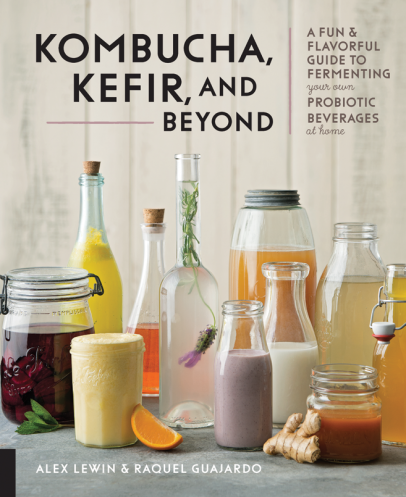Healthy Fermented Drinks
Author Alex Lewin is a graduate of Harvard, the Cambridge School of Culinary Arts and the Institute for Integrative Nutrition. He seeks to create a healthier and tastier world by spreading the good news about fermentation and real food. He leads fermentation classes and workshops in the U.S. and abroad. He served on the opening board of the Boston Public Market, the only local, indoor, year-round market of its kind in the U.S. He is also involved with Boston Ferments, a nonprofit that organizes and hosts fermentation-related events, including the Boston Fermentation Festival.
We caught up with Alex and asked him a few questions to get to know him a bit more. —Jennifer Rubenstein
Edible Indy: Why did you decide to write a book?
Alex Lewin: Much of the industrial world is in the grips of a health crisis, and also a crisis of consciousness. Making our own food can help with both. It's also fun and saves money. Fermented drinks are a great entree to the world of fermented foods because everyone drinks something, and some fermented drinks feel very familiar. I wanted to get the word out so that people could be healthier and happier, free themselves from the worst parts of industrial capitalism and marketing, and regain a feeling of control over a part of their lives.
EI: What is your favorite recipe in the book?
AL: The pineapple wine recipe (tepache) has a lot going for it. It lets us use food scraps that otherwise would have been discarded, and it produces a fun, low-alcohol drink that's hard to find in the market. And if you mess up, you wind up with pineapple vinegar, which is also great.
Other recipes I keep coming back to are the switchel recipe and the lassi recipe. They lower the bar for making fermented drinks—5 minutes or less!
EI: What is one kitchen tool you can’t live without?
AL: The human hands are the most fantastic and versatile kitchen tools. If I had to choose the next most critical, I'd say an 8"+ forged chef's knife! Tool most likely to make you go "ahhh!" the first time you see it: the pineapple screw.
EI: Who is someone who influenced you in your life with food and why?
AL: Sandor Katz really opened my eyes to radical food movements, and to fermentation. Choosing what we eat is not merely a matter of preference—every choice we make can be a statement. Nowadays, it seems obvious that food and politics go hand-in-hand, but ten or more years ago, it was not quite as obvious, at least to the mainstream. And what's fantastic about food politics is that it cuts across our calcified party system in the U.S., and finds some unlikely-sounding allies from the "left" and the "right," unified by the idea that self-determination is central to the human experience. For instance, Barney Frank and Ron Paul co-sponsored a bill in Congress having to do with raw milk!
About the Book
Fermented foods have taken the world by storm, as they help improve digestion, enable us to better assimilate vitamins and minerals and strengthen the immune system.
Of all fermented foods, drinks like kombucha, Teach (pineapple wine), ginger ale and beet kvass are some of the most versatile—and tasty. Many of these items you can buy in the store, but making them at home is fun, simple, economical and even better for you. With just a few ingredients and materials, you can start brewing your own delicious probiotic beverages for your family.
KOMBUCHA, KEFIR, AND BEYOND: A FUN AND FLAVORFUL GUIDE TO MAKING YOUR OWN PROBIOTIC BEVERAGES
This fascinating and educational book is packed with innovative drink recipes, from healthy homemade sodas to traditional kvass and cider that you can make in your own kitchen and enjoy all year long. Author Alex Lewin concentrates on the dynamic benefits for making kombucha, kefir and other fermented drinks at home. It provides base recipes and allows you to play with your food and experiment with the process of fermentation.
Engaging fermenters of all levels, this book will provide: 5-minute recipes for lassis, fermented lemonade, and more; how to use starters to make kombucha, kefir, root beer, wine, and others; the process, the tools and how to get started; why to ferment your drinks; the health benefits of fermented drinks; age-old recipes for kvass, switchel, vinegar, and mead; why the recipes work, why they are safe, what to do if they go wrong and how to modify them to suit your taste; and the history of fermentation and the value of traditional foods.





